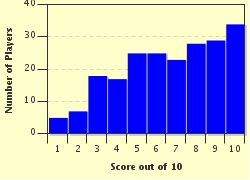Quiz Answer Key and Fun Facts
1. What great writer of epic poetry also wrote a sonnet referred to as "Methought I Saw My Late Espoused Saint", a poem about an actual dream during which he sees the beauty of his wife and then wakes from that dream to face a world in which his wife is dead and he is blind?
2. What metaphysical poet wrote "The Flea", a poem in which the speaker compares the act of a flea's sucking blood from the woman he would sleep with to the act of their having sexual intercourse, and "A Valediction: Forbidding Mourning", a poem in which the speaker compares himself and his lover to the two legs of a mathematical compass used for drawing circles?
3. What is the title of the famous "carpe diem" (seize the day) poem by Andrew Marvell that urges a woman to move their relationship forward to the next step with such couplets as "But at my back I always hear / Time's winged chariot hurrying near" and "Nor, in thy marble vault, shall sound / My echoing song; then worms shall try / that long preserved virginity, / And your quaint honor turn to dust, / And into ashes all my lust"?
4. What is the title of the highly significant philosophical work published in 1651 by Thomas Hobbes, who argued that everything in existence was made of matter, that nothing spiritual existed, that every event was a result of a cause and effect relationship, that humans were animals that lived in fear of one another, and that absolute sovereign governments were necessary to restrain humans and keep them from annihilating one another?
5. What writer, philosopher, and statesman, who rose as high as possessing a title of Viscount and fell as low as being found guilty of twenty-three counts of corruption and accepting bribes, is most well known for his essays whose titles began with the preposition "Of": for example, "Of Studies", "Of Truth", "Of Marriage and Single Life", and "Of Superstition"?
6. George Herbert's contribution to literature is his collection of religious poetry entitled "The Temple", which was published after his death. What is the name of one of his most famous poems from this collection, a poem in which he discusses the frustrations of a minister's life by comparing part of a priest's clothing to a shackle?
7. What is the name of the "carpe diem" themed poem, written by the cavalier poet Robert Herrick, whose words--"Gather ye rosebuds while ye may"--are quoted often in Peter Weir's 1989 film "Dead Poets Society"?
8. What is the name of the cavalier poet who wrote the following famous lines in his poem "To Althea, from Prison": "Stone walls do not a prison make, / Nor iron bars a cage; / Minds innocent and quiet take / That for an hermitage. / If I have freedom in my love, / And in my soul am free, / Angels alone, that soar above, / Enjoy such liberty"?
9. This individual is famous for his masques (like "The Masque of Blackness"), his plays (like the satirical "Volpone"), his poetry (like the epigramatic "On My First Son"), and ultimately his collection of all his writings (entitled "Works") which led to his being derided by his contemporaries for the arrogance he demonstrated by publishing his life's works before he had died. Who was this versatile writer?
10. In this most significant masterpiece, not only of the seventeenth century but the entire span of English literature, the writer attempts to "justify the ways of God to men". At one point, he explains the existence of evil in the world through a scene in which God watches Satan leave Hell to go destroy mankind yet refuses to intervene because to do so would interfere with everyone's freedom to choose good or to choose evil. To which masterpiece am I referring here?
Source: Author
alaspooryoric
This quiz was reviewed by FunTrivia editor
looney_tunes before going online.
Any errors found in FunTrivia content are routinely corrected through our feedback system.

